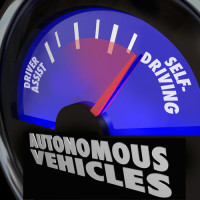California Welcomes Self-Driving Cars, But Not Self-Driving Car Crashes

As part of an omnibus insurance bill, the California legislature recently passed a law regulating what it calls “autonomous vehicles” but that are also variously called self-driving cars or robo-cars by the general public. Although the technology is here today, any self-driving cars so far on the road have been strictly used for testing only. Nevertheless, the California legislature clearly sees that autonomous vehicles are in our near future and is paving the way for their safe entrance onto our highways and roads.
Assembly Bill 2734 passed the legislature with unanimous votes in both houses and was signed by the Governor on September 16th. Section 9 of AB 2734 amends the California Vehicle Code section 38750, which is a relatively new section of law devoted exclusively to self-driving cars and was first enacted in 2012.
“Autonomous technology” is defined in the law as technology that has the capability to drive a vehicle without the active physical control or monitoring by a human operator, regardless of whether there is a person actually physically present in the “driver’s seat” or not. To think about how far along we are toward giving up driving control to the car, consider all of the following features which are NOT considered autonomous technology within the meaning of the statute:
- Collision avoidance systems
- Automated emergency braking systems
- Park assist
- Adaptive cruise control
- Lane keep assist
- Electronic blind spot assistance
- Traffic jam and queuing assist
- Lane departure warning
All of these features are meant to enhance safety or provide driver assistance, but they are not capable of driving the vehicle without the active control or monitoring of a human operator. How many of us have already given up active monitoring of driving conditions and come to rely on these passive features to keep us safe?
Safety First, Self-Driving Cars Later
Safety is of course a paramount concern with self-driving cars, as is financial responsibility in the event of a self-driving car crash. AB 2734 currently allows an autonomous vehicle to be operated on public roads only for testing purposes and only with a driver who possesses the proper class of license for the type of vehicle. In addition, the driver must be either an employee, contractor or other person designated by the manufacturer, and the driver must sit in the driver’s seat, monitor the car’s operation, and be capable of taking over control when necessary. Finally, the manufacturer must carry liability insurance or proof of financial responsibility in the amount of $5,000,000, which is a tad higher than the $15,000 required of the average California driver.
In addition to creating rules for testing self-driving cars on public roads, the new law also seems to contemplate the use of autonomous vehicles by the general public, which could be as soon as five years away. AB 2734 will require the manufacturer to first submit an application before a self-driving car may be operated on public roads. The autonomous technology must be able to be engaged and disengaged, and the driver must be able to take control of the accelerator, brake and steering at will. The vehicle must provide a warning if any autonomous technology failure is detected and must be programmed to come to a complete stop if the driver does not take over. The vehicle must also comply with all applicable Federal Motor Vehicle Safety Standards and must capture and store sensor data for 30 seconds before a crash.
The law also requires the California Department of Motor Vehicles to adopt new regulations for self-driving cars by January 1, 2015. In its regulations, the DMV is authorized to limit the number of self-driving cars which may be allowed on the road, and the agency can also make new license requirements for operators of self-driving cars. The law applies to autonomous vehicles that are operated with or without a driver in the car. Manufacturers expect self-driving cars with driver assist to hit the roads by 2020, with fully autonomous vehicles arriving by 2030.
Other Self-Driving Car Bills
Other bills were also introduced this session which deal with self-driving cars. AB 2258 would authorize the City of Lancaster to research and develop autonomous public buses. This bill was introduced in February and referred to the Transportation Committee, but was never voted out. SB 1204, on the other hand, was signed into law on September 21st. This measure creates the California Clean Truck, Bus, and Off-Road Vehicle and Equipment Technology Program, which is a grant-funding mechanism to encourage research and development for zero and near-zero emission trucks and buses, funded by carbon emissions “cap and trade” revenues. SB 1204 includes autonomous vehicle projects as eligible for disbursements from the fund.


 Close Menu
Close Menu